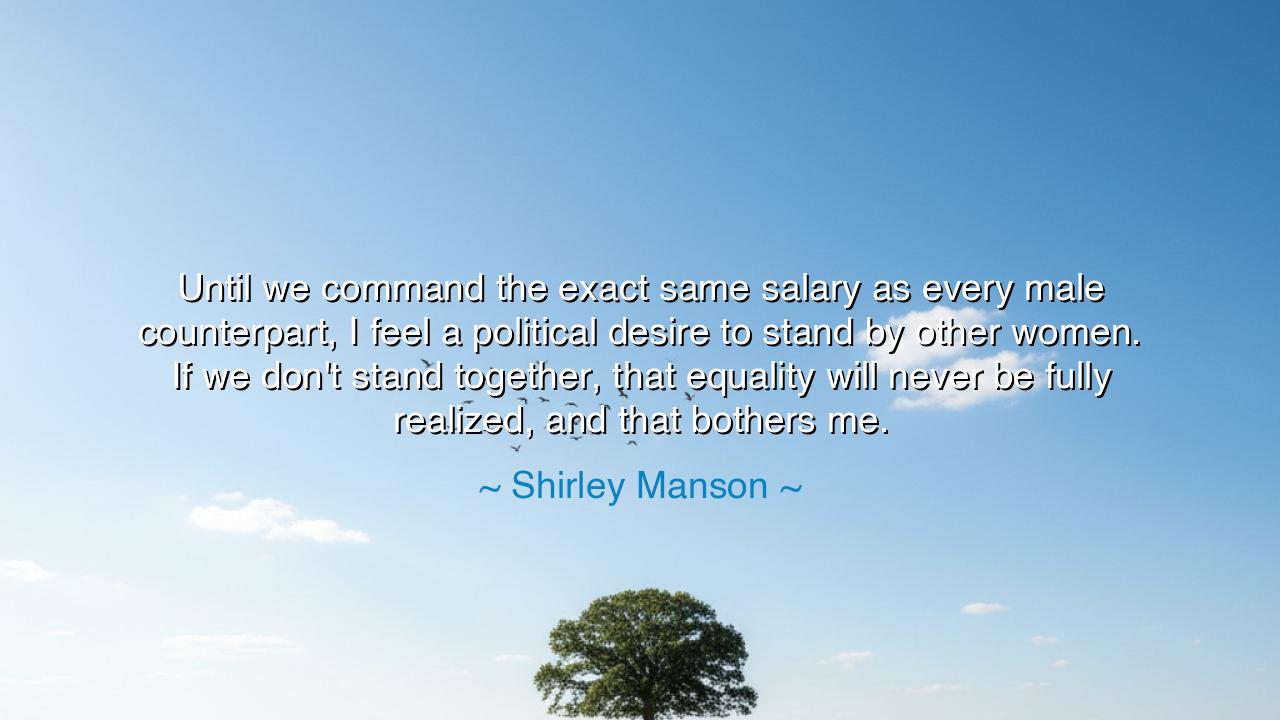
Until we command the exact same salary as every male counterpart
Until we command the exact same salary as every male counterpart, I feel a political desire to stand by other women. If we don't stand together, that equality will never be fully realized, and that bothers me.






In the fiery and unflinching words of Shirley Manson, there echoes the voice of both rebellion and solidarity: “Until we command the exact same salary as every male counterpart, I feel a political desire to stand by other women. If we don’t stand together, that equality will never be fully realized, and that bothers me.” These words, though born from the struggles of modern times, carry the spirit of ancient justice. They are the cry of a woman who sees beyond her own success into the vast unfinished work of her generation—the work of equality, of shared power, of voices rising together against centuries of imbalance. Manson speaks not only for herself, but for all who have labored beneath systems that valued their talent less simply because it came in a woman’s form.
The meaning of this quote lies in its powerful union of moral truth and political will. Manson, known for her strength and candor as the lead singer of the band Garbage, is not merely calling for fairness in wages—she is declaring that equality itself is collective. Her words remind us that no victory is complete if it leaves another behind. “Until we command the exact same salary,” she says—not “I,” but “we.” It is a statement of unity, of shared purpose. She recognizes that individual achievement, however great, cannot replace systemic justice. To her, true progress is not measured by one woman’s success, but by the elevation of all women to equal footing with men in value, in respect, and in reward.
The origin of these words can be found in both her personal conviction and the long history of women’s struggle in the workforce. From the factories of the Industrial Revolution to the studios of Hollywood and the stages of rock and roll, women have fought to be compensated equally for equal work. Yet Manson’s voice joins a chorus that began long before her birth—a chorus that includes Sojourner Truth, who in 1851 asked, “Ain’t I a woman?”; Emmeline Pankhurst, who fought for women’s political power; and Eleanor Roosevelt, who proclaimed that justice must begin in small places, close to home. Manson’s fight is part of this same lineage, brought into the modern age where the pay gap persists like a ghost of injustice.
To understand her spirit, one might look to the story of Lilly Ledbetter, the American factory worker whose quiet courage transformed U.S. law. For nearly twenty years, she worked at Goodyear, unaware that she was being paid far less than her male counterparts. When she finally discovered the truth, she sued—and though the Supreme Court ruled against her due to a technicality, her struggle inspired Congress to pass the Lilly Ledbetter Fair Pay Act of 2009, ensuring that such injustice could no longer be hidden behind the veil of time. Like Manson, Ledbetter’s fight was not only for herself—it was for those who would come after. Her legacy stands as proof that equality is not given; it is won through persistence and solidarity.
Manson’s statement also speaks to the political power of unity. She says, “If we don’t stand together, that equality will never be fully realized.” This is both a warning and a call to arms. The divisions among women—across class, race, and industry—have too often been exploited to preserve the status quo. But she insists that equality can only be achieved when women lift one another rather than compete for limited spaces. Her political desire to stand with others reflects the ancient principle of sisterhood: that strength multiplied by compassion becomes unstoppable. Like the Spartans who fought shield to shield, progress requires standing in formation, refusing to yield ground until justice is complete.
Yet her words are not only political—they are deeply moral. The imbalance of pay is not just an economic failure; it is a spiritual wound in the fabric of humanity. It declares that one gender’s labor is worth less, that its dreams are smaller, its contributions secondary. Manson’s discomfort—“that bothers me”—is not mere irritation; it is the moral unrest that lives in every person who has glimpsed inequality and can no longer turn away. Her unease is the beginning of wisdom, for the soul that is disturbed by injustice has already begun to act against it.
Therefore, O listener, take this lesson as both challenge and commandment: where you see inequality, do not remain silent. Support those whose voices are still unheard. If you are a woman, lift your sisters beside you; if you are a man, lend your strength to balance the scales. Demand transparency, fairness, and integrity in all places of labor. Know that every act of solidarity—every stand taken in truth—pushes the world a step closer to justice. Equality is not a dream deferred to future generations; it is a promise to be fulfilled by ours.
And so remember the enduring wisdom of Shirley Manson: that equality cannot exist without unity, and unity cannot exist without courage. Her words remind us that to stand by one another is not an act of charity, but of power; not a sign of weakness, but of strength. When women, and indeed all people, stand together and demand what is rightfully theirs, the world begins to change. And one day, when the pay is equal and the respect universal, we will look back and know that it was solidarity—not silence—that built the future we deserved.






AAdministratorAdministrator
Welcome, honored guests. Please leave a comment, we will respond soon